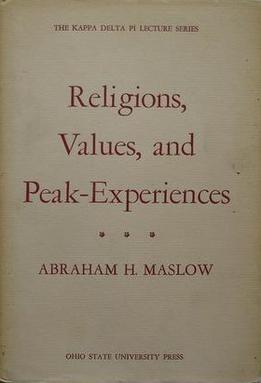Top Qs
Timeline
Chat
Perspective
Religions, Values, and Peak Experiences
Book by Abraham Maslow From Wikipedia, the free encyclopedia
Remove ads
Religions, Values, and Peak Experiences is a 1964 book about psychology by Abraham Maslow. Maslow addressed the motivational significance of peak experiences in a series of lectures in the early 1960s, and later published these ideas in book form.[1]
Remove ads
Overview
In contrast with the preoccupation of Freudian psychopathology, Maslow insisted on a "psychology of the higher life" which was to attend to the question "of what the human being should grow toward."[2] In his work, Maslow described the experience of one's life as meaningful as being based on a feeling of fulfillment and significance.[3]
Maslow's theory of "peak-experiences" has been compared to William James' "healthy-minded" religion.[4] Maslow hypothesized a negative relationship between adherence to conventional religious beliefs and the ability to experience peak moments.[5]
In Religions, Values, and Peak Experiences, Maslow stated that the peak experience is "felt as a self- validating, self-justifying moment which carries its own intrinsic value with it." Furthermore, the person is the "creative center of his (or her) own activities."[6]
Remove ads
See also
References
Wikiwand - on
Seamless Wikipedia browsing. On steroids.
Remove ads

